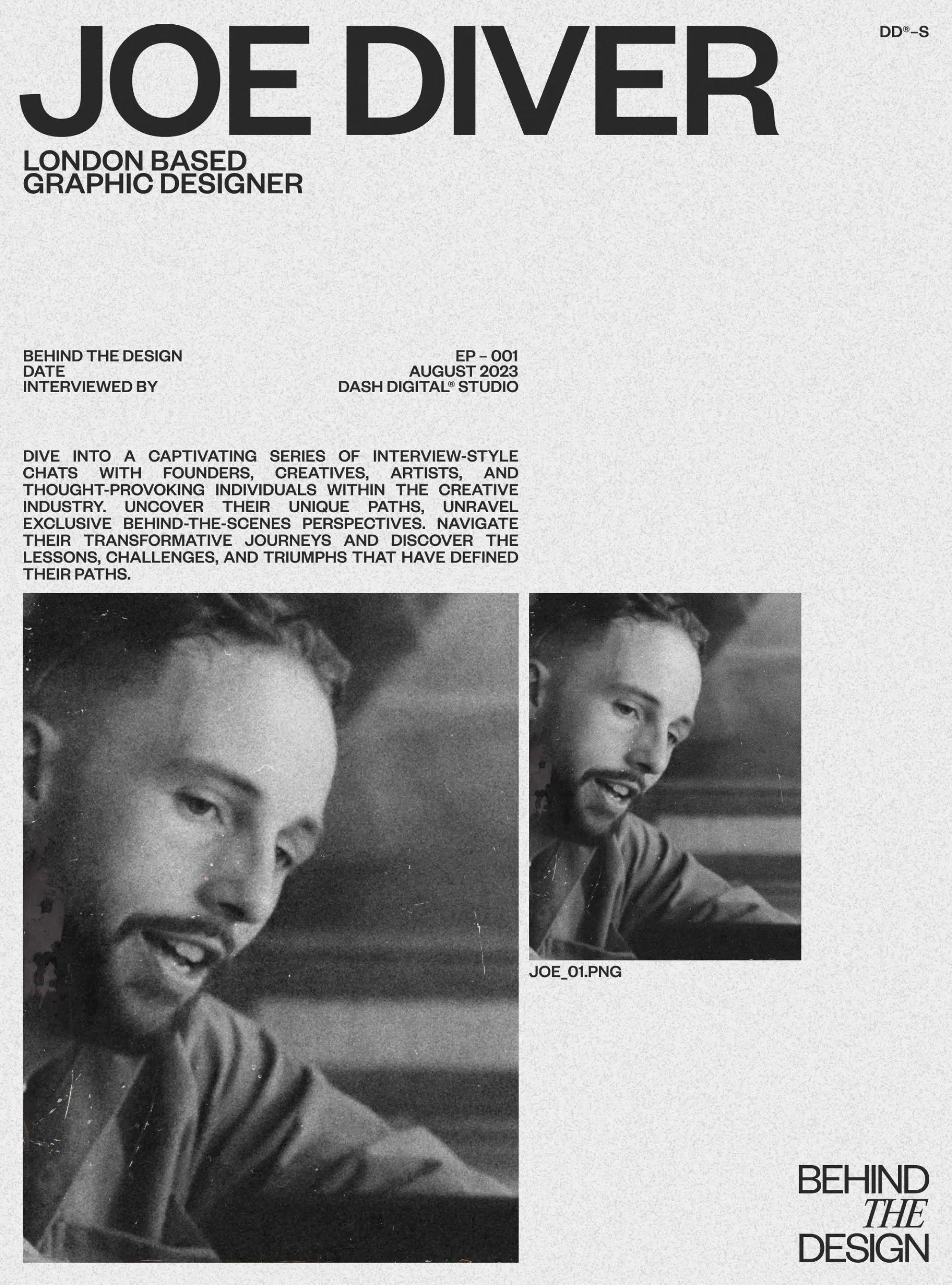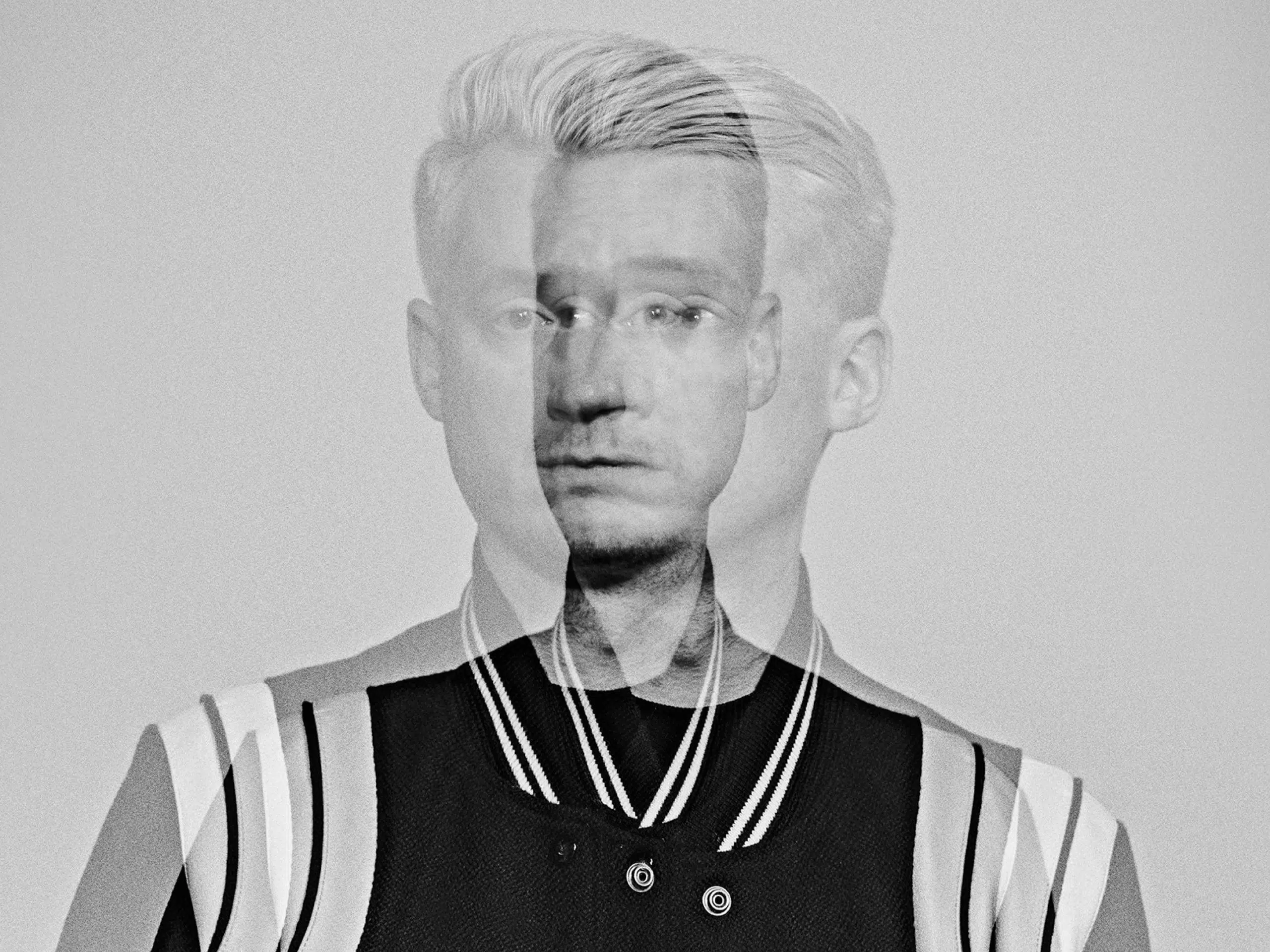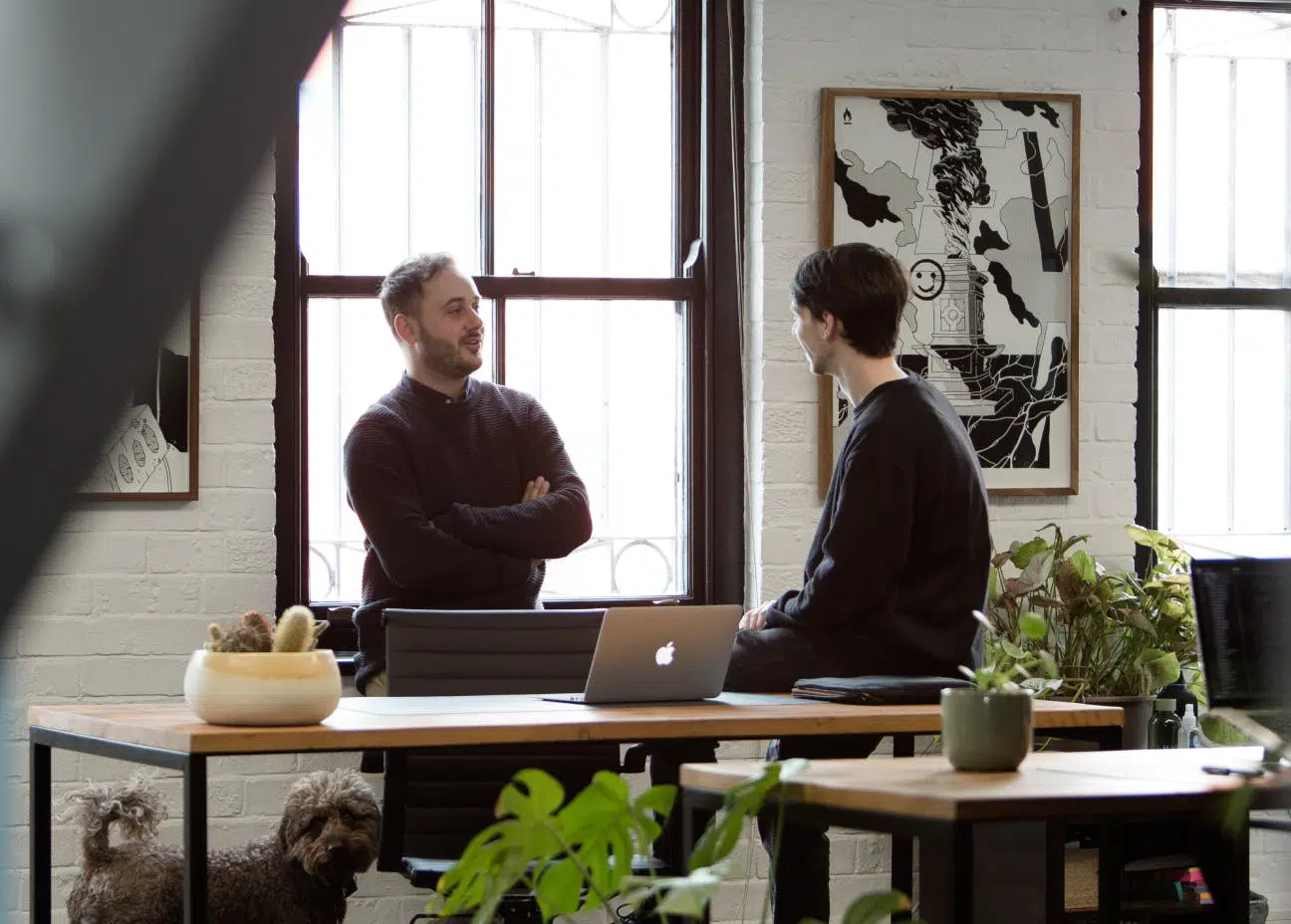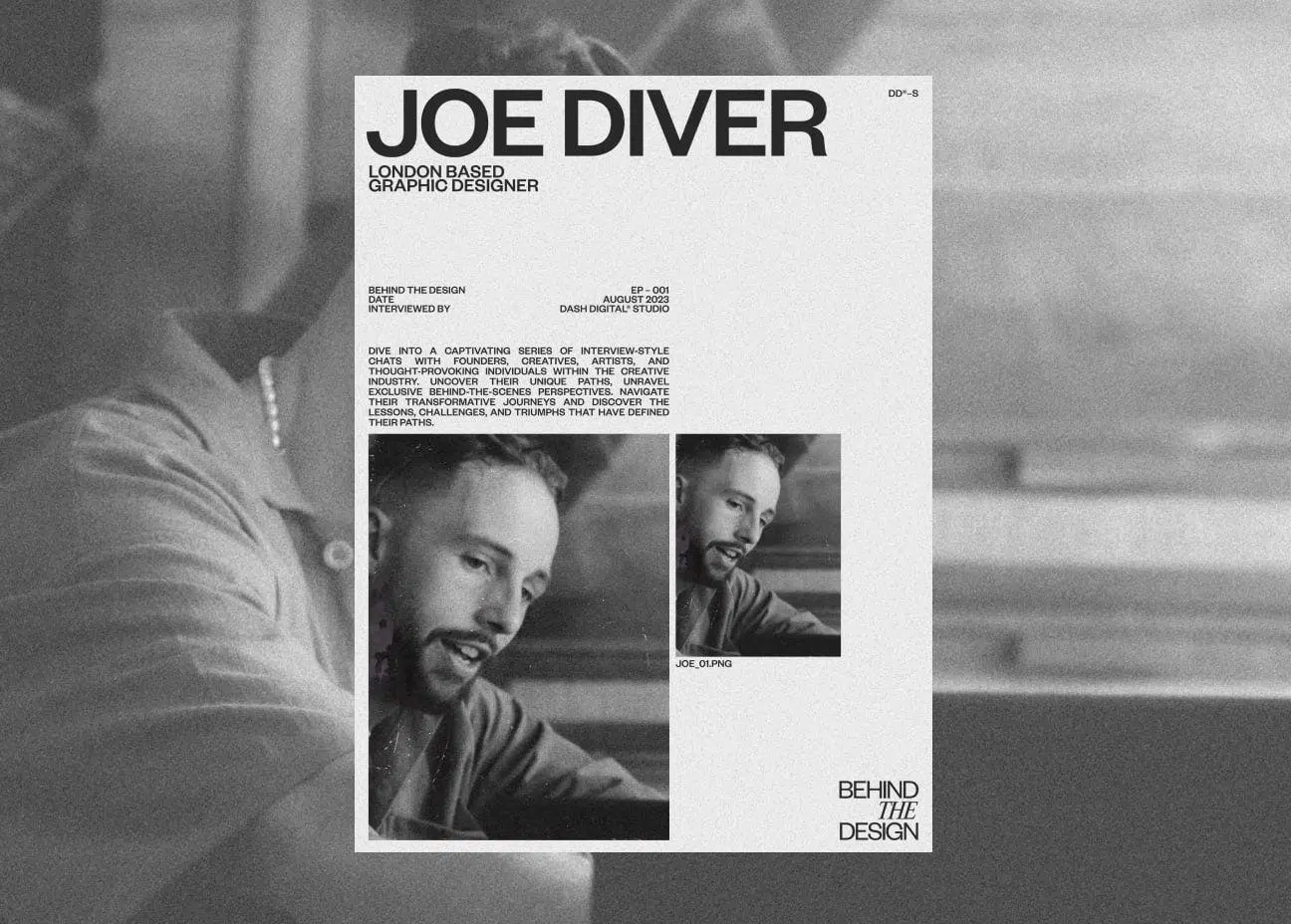Joe Diver
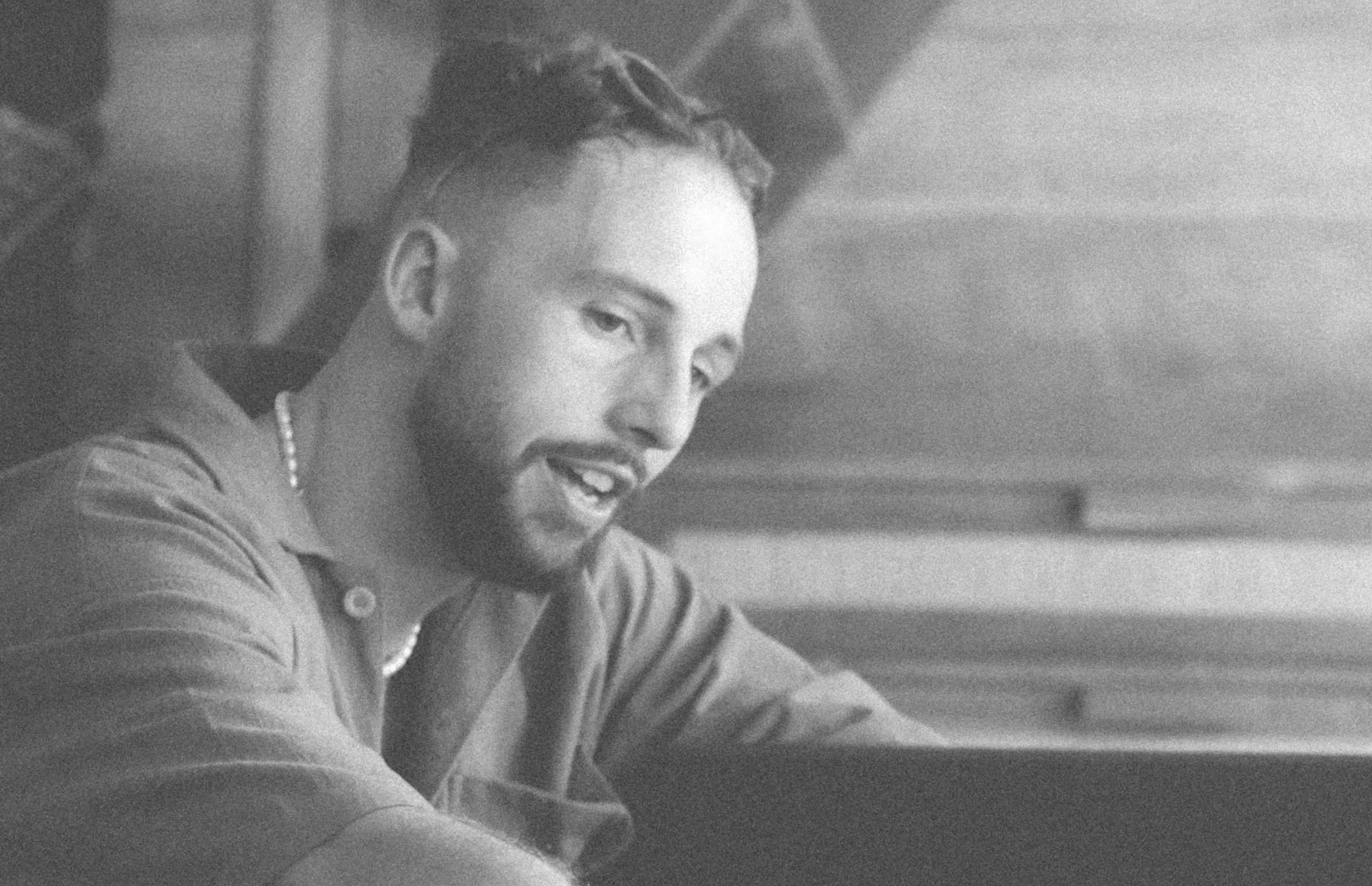
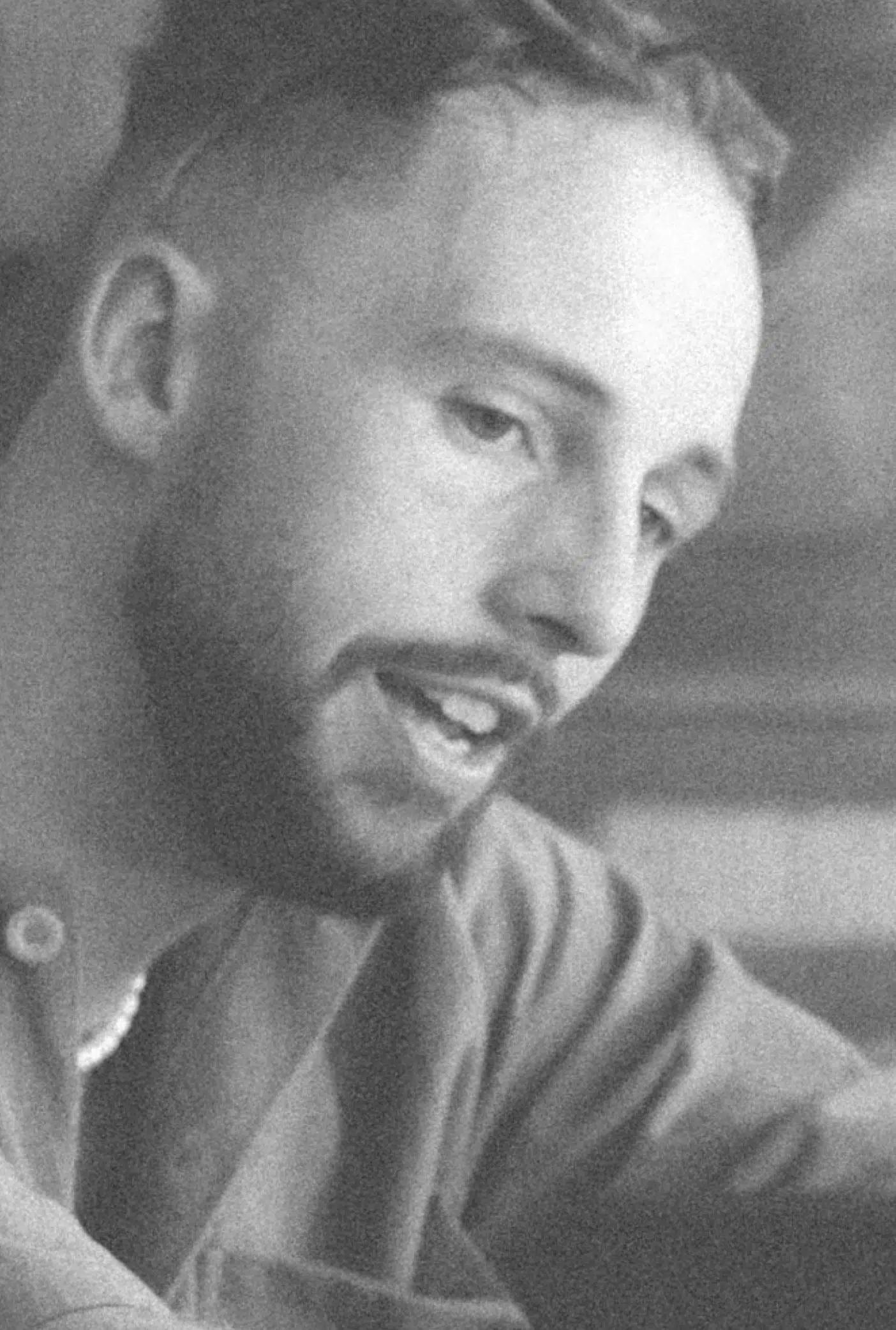
He has inspired us immensely over the past couple of years and the prospect of chatting with him to explore his design journey is truly exciting. Let's step into Joe Diver's creative space and unveil the chapters of his story.
You recently started a video tutorial series. Could you take us through the decision behind that and how it's coming along?
What I was thinking about, maybe six months ago, is the fact that although many of the people who follow me are people who might be interested in my services (like brand identity or web design), a lot of the people on there are actually individuals who are trying to learn about design, trying to develop their own careers, and gain an understanding of how this industry works.
I get a lot of DMs and enquiries where people ask me “What's your creative process?”, “How do you acquire clients?” and things like that. So I really wanted to help those people and I thought the best and easiest way to do that was by releasing a tutorial of some kind. I have a lot in the works that will hopefully be able to help those individuals, such as communities, coaching, and that kind of stuff.
Ultimately, I think that sort of idea came from feeling like there was a little bit of a lack of transparency in the industry between this kind of higher level and the bottom. I suppose I just want to, in whatever way I can, bridge that gap, because I know I would have really benefited from that when I was coming up.
I think that's one of the reasons why we've started this project, because it's exactly that level of transparency from top to bottom which is needed. I think a lot of it is that people are just trying to understand the process.
I've been really pleasantly surprised with the engagement. I think there's definitely an appetite for it and it's great that you guys are doing something similar, and obviously, we're all busy. Every designer is busy and you can only do so much, but I think if we all make an effort to give at least a small percentage of our time to educating others and just kind of try to bridge that gap. I think it's only going to have a positive impact on the industry.
We see you post self-initiated work which is always great. What is your percentage split of time between paid client work and self initiated / upskilling?
It's difficult to say and I think as my career has advanced, I'd say the tide has turned way more towards client work. I think in the beginning when you are trying to develop your style, develop your skill set, self-initiated work probably forms more of a significant part. Back then it was probably a lot higher, but now I'd say maybe I still try and spend about 15 - 20% of my time on self-initiated work, and that's not just creating and designing but also upskilling, taking courses.
I'd say that's probably a rough guideline, but I strongly believe in the importance of self-initiated work. I think I did a Twitter thread (or X thread, as I should call it now) about how conceptual and self-initiated work is so valuable for young creatives and inexperienced creatives, because maybe, when you're not getting a flow of jobs coming in, it still provides an opportunity to create and develop your skills and then eventually those clients will come.
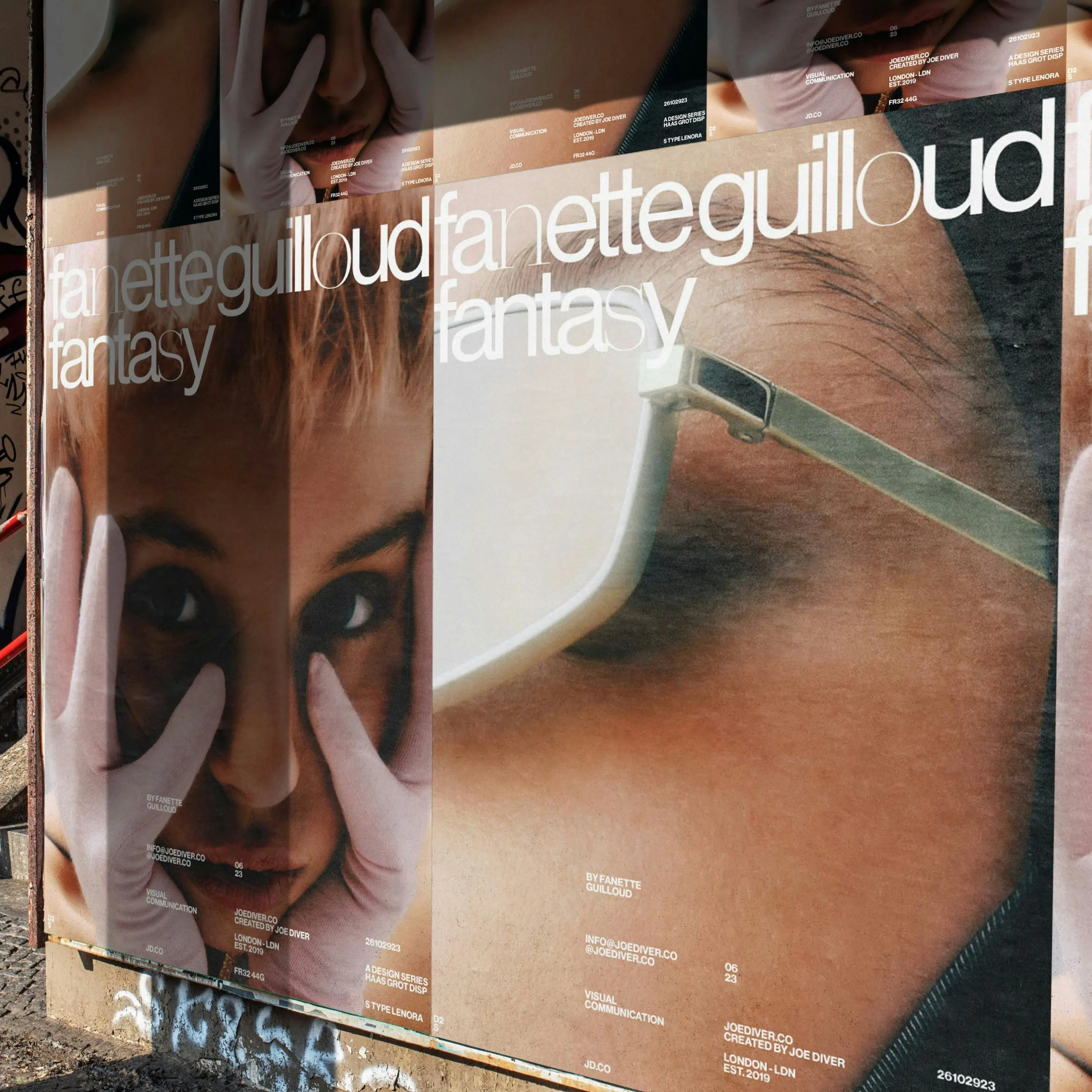
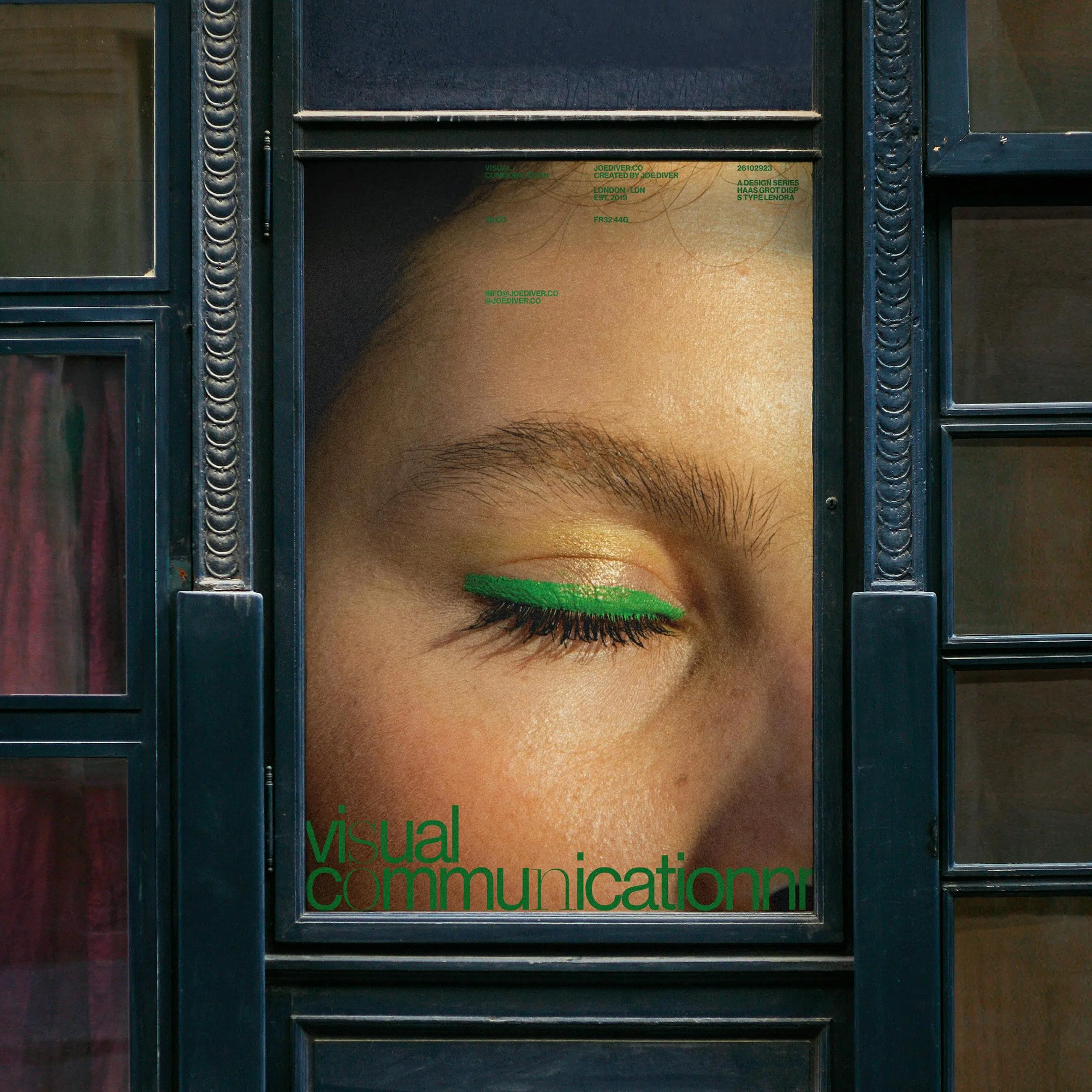
I agree and often tell juniors exactly that. I think it's the self-initiated work that gets you the jobs, especially when you freelance and you're not picking up nice exciting work that’s portfolio worthy. So the self-initiated work is really the stuff that shows your talent and gets your foot into the client's door.
You mentioned earlier that people slide into your DMs, but how do you go about finding new work?
It's a real mixture but I think social media is a big part of it. I've always put a lot of emphasis on building an online presence. Whether you like it or not, I feel like it's quite an essential part of running a digital design agency or freelancing. Whether they come through email or DMs, a lot of them come through the presence that I've developed on Instagram and Twitter.
However, I think now that I'm a little bit further into my career, a lot of the work I get will be through word of mouth and recurring business. If I've done a web design for someone, they might in two years decide “we’re ready to do the brand identity now”.
And then the last one I'd say is I've very recently started working with an agency called Appart, which you may be aware of. I've known the founder, Phil Bastiaans for around two years and we actually bumped into each other in Vietnam, really weirdly. So that will form a little bit more of my client base as we progress through next year and Q4 this year.
You mentioned working with Phil, would you then be white labelled under his studio or do you go in as a collaboration partner?
It's a kind of collaboration partnership. Phil understands that people like myself, I have my own brand and I have my own work, and the way that I like to do things. And I think if there's a project where he needs my skill set, then it's going to be more of a collaboration rather than any sort of employment or anything like that. It's a collaboration and I love working in a team.
I think the collaboration model is always so much better. It's something we value in the studio, because the roles and responsibilities or the accountability becomes a lot stronger when someone's name is associated with the project.
How do you normally structure your workday?
What a lot of people probably don't know about me is, as well as being very interested in the design world, a lot of my time I love listening to podcasts and watching YouTube on things like productivity and self-development and all that kind of stuff. I'm just really interested in that kind of thing and what that leads me to do. So I'm always trying different daily routines to see what suits me best.
I think as a freelancer and an entrepreneur it's essential that you find something that works really well for you. In terms of my daily structure, I like to wake up fairly early, get some exercise as soon as possible, have a coffee break, and set myself up for the day.
I try to front-load the hardest and most important tasks in the morning-to-early-afternoon period, take a little break, and then come back to it and do some lighter work, which may involve self-initiated projects or things that are not as pressing.
My brain is the sharpest in the morning and early afternoon so I like to take advantage of that and try not to work in the evenings. I was talking to someone the other day and I think some creatives and designers seem to get this spurt of creativity at like 9pm, which can be quite frustrating but sometimes you've got to leverage that if it comes to you.
I think I was always drawn to the fathers of Swiss design, people like Josef Müller-Brockmann and Wim Crouwel, and studied that massively.
Your style has a very editorial, grid-based approach, then layered with amazing textures. Where do you pull inspiration from and have you always been interested in that kind of design?
I think I've always been drawn to a very grid-based structure, and quite minimalistic aesthetics. Whether that be looking at certain furniture or architecture, for whatever reason, I'm just drawn to quite minimalistic things.
That said, I also have massive admiration for more traditional, complex designs. I try to weave those in and create a mixture instead of just being one-dimensional in terms of where that inspiration came from. I think I was always drawn to the fathers of Swiss design, people like Josef Müller-Brockmann and Wim Crouwel, and studied that massively. Especially at the start of my career.
I think I then just wanted to try and bring that into the modern world because I saw how that stuff works in the 50s and 60s. There's no reason why I can't bring that forward and start implementing it in the modern world - especially in the fashion space, creative space. I think there's a lot of opportunity for that to be explored. I've always loved that kind of minimalistic look and I think that's where that came from.
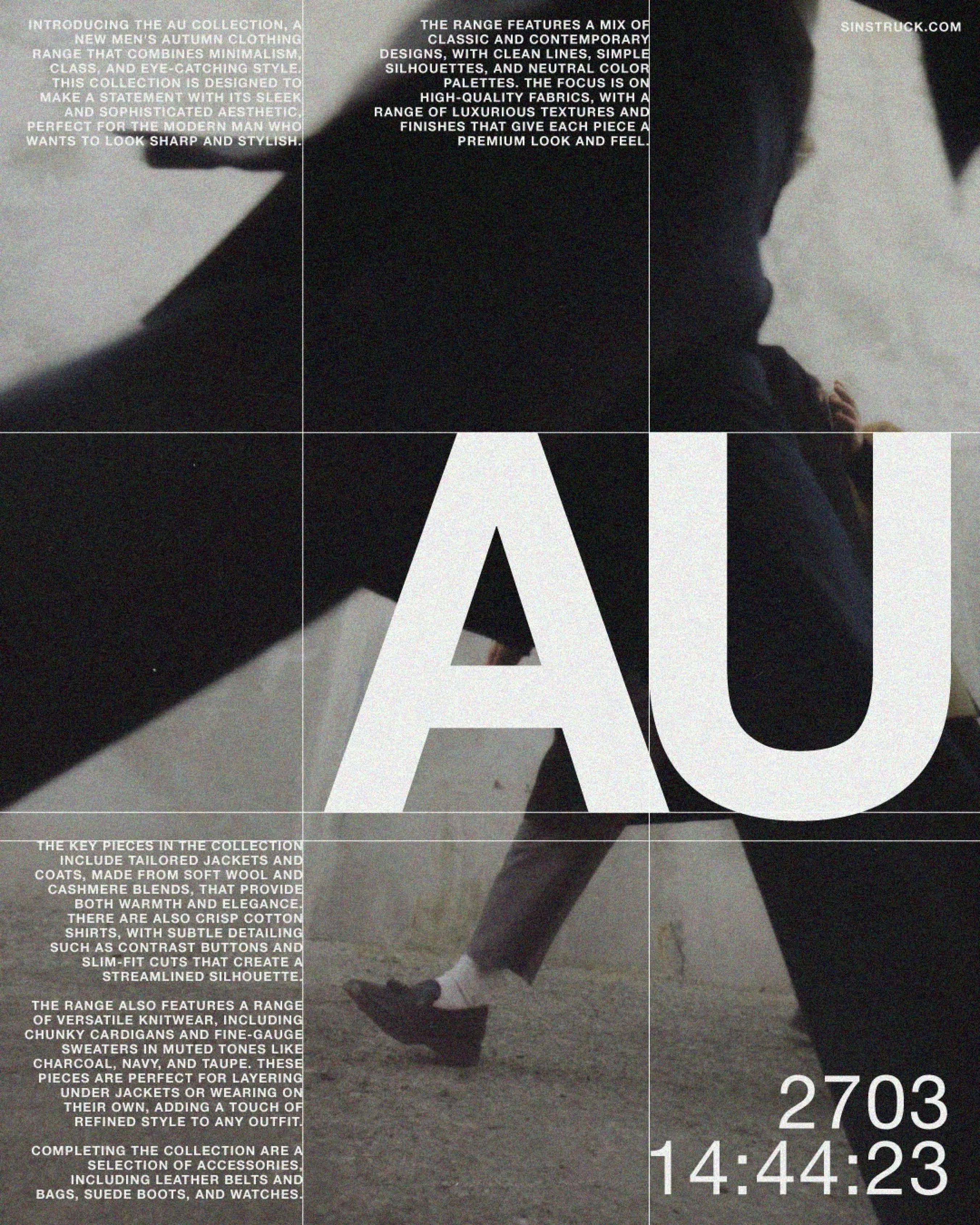
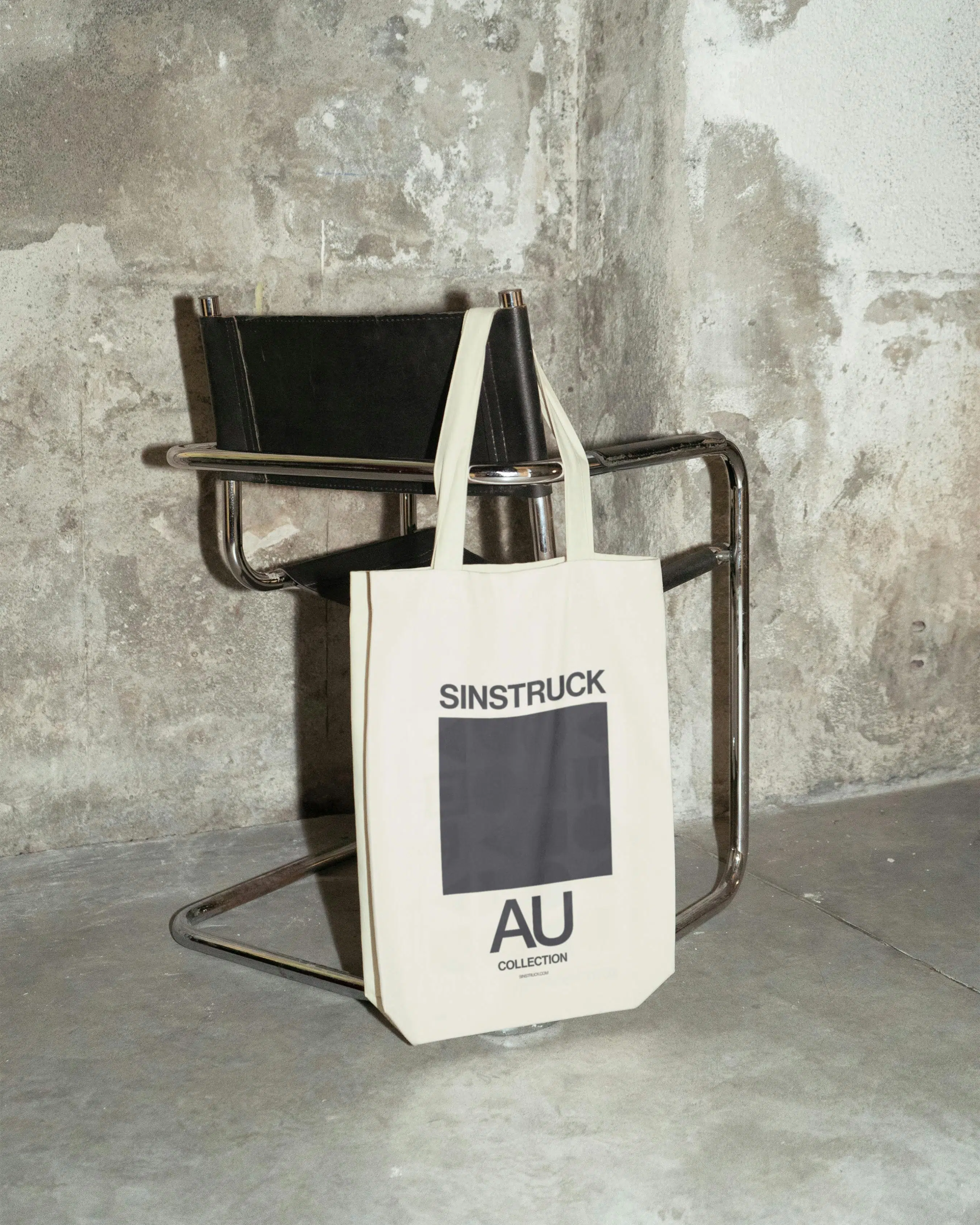
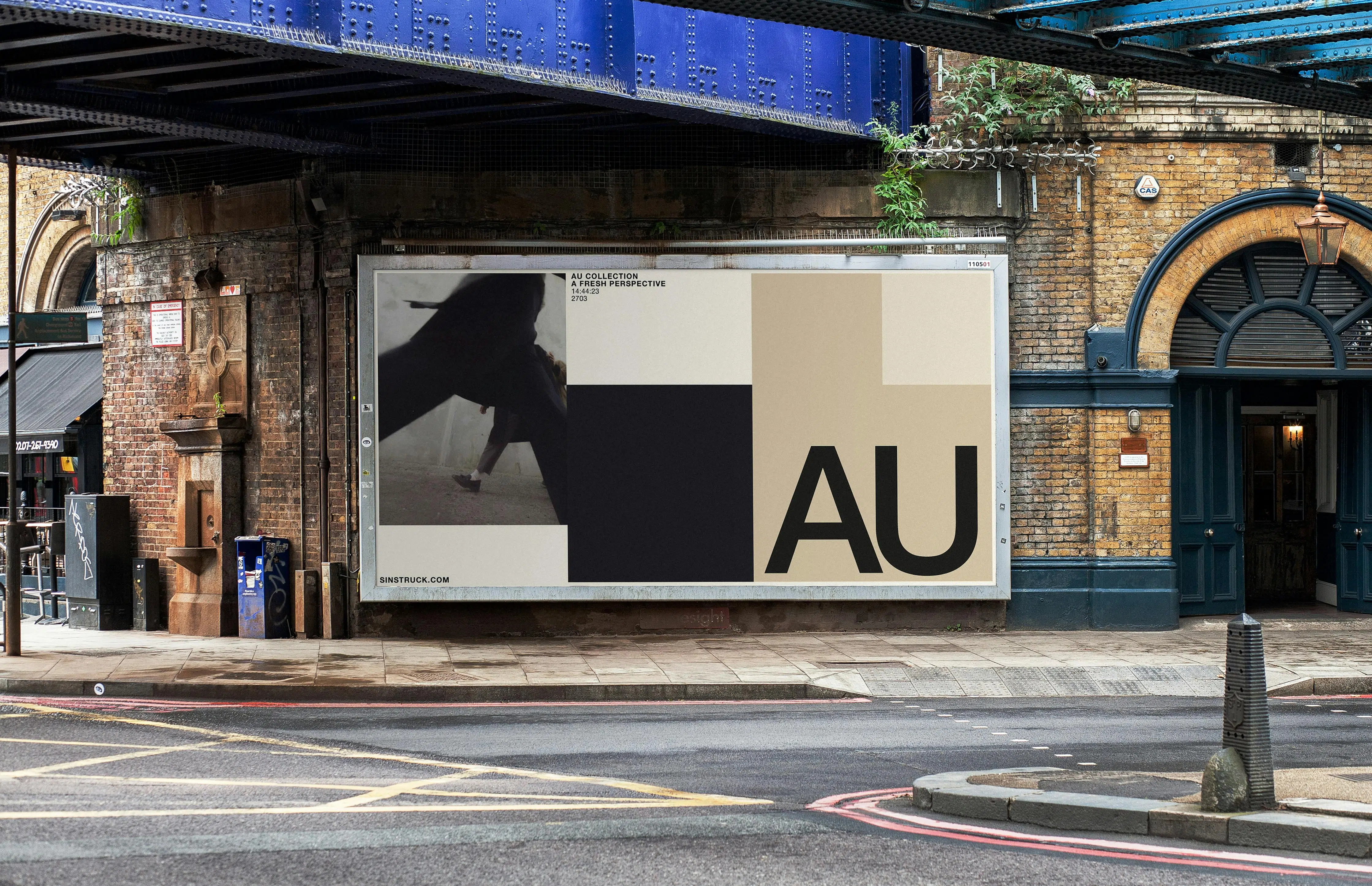
Do you have a set process for each project?
I'd say I'm pretty fluid. It does vary in some ways and I think most designers will understand that. In most cases, you can never really say that in order to get to the end product you need to go: step one, step two, step three, and step four. However, I do follow a rough process in terms of making sure that I reach the place that we're trying to get to.
Typically that will revolve around a lengthy mood-boarding and brainstorming process, in which we kind of craft the overall direction of the project. Then, what I'll do once we've established that is kind of go into an initial draft phase which is just me playing around, experimenting and just creating something that I think fits the overall direction of the project. Then, we sit down and review that with the client. Once you've established that, I'll start building the kind of foundational blocks of that brand or project, and sometimes that will revolve around a few revision rounds potentially. Then, from there we develop assets like social media and business cards or billboards or whatever it might be.
I think those initial fact-finding stages of brainstorming or mood-boarding, experimenting, and always getting feedback from the client is essential. I'm a big fan of working in short sprints, and not just going all in on your own for two weeks. I think it's important to get feedback along the way.
How do you normally work through a creative block? Any words of wisdom for us?
I think the first thing is to not fight it. Everyone gets it, you don't just have to be a designer or artist to get a creative block. I think if you feel that, It's useless fighting it. I think you just need to say, ‘Okay, this has happened. Let me take a break, go for a walk or even take the rest of the day off’, if you can do that - but don't fight it. And I think the more you fight it, the longer it will continue.
The other thing I would say is, I think in today's world, there's a real hustle culture and I think people almost gloat about how much they work, like “I work 18 hours a day” and it's like, that might not be the most beneficial way to develop yourself and your career.
If you don't feel up to working, you shouldn't force yourself to do so and if you feel motivation and inspiration, I think you should really take advantage of that and work as much as you feel like working. But if you don't feel like that, take a couple of days off and that motivation will come back.
What has been one of your biggest challenges in your career?
For me when I was first starting out, I think it was confidence. This probably sounds a bit vulnerable but I think it definitely was. I didn't go to university to study design, I actually studied marketing and business. And for whatever reason, I always felt a little bit of inadequacy on that front. Especially as the scope of the inquiries that I was getting increased to larger brands and larger clients. I definitely felt that kind of imposter syndrome.
I'm self-taught. I've learned through doing, taking online courses, mentors, and also working on so many different projects.
So when you say you didn't study, so you're completely self-taught then?
I didn't study design at university. I just studied marketing, which definitely helps on the branding and web design side of things. But yeah, I'm self-taught. I've learned through doing, taking online courses, mentors, and also working on so many different projects.
Where was the swing? Was it “I don't want to do this anymore” and, intentionally, “I'm going into design”? Or was it a gradual process that you started learning design and picking up an odd job? How did you navigate going into a completely different industry?
I'd say it happened slowly, but probably from an outsider's perspective, maybe it happened quite quickly. I've always designed since I was very young, whether it be just tiny little things on my laptop, or art, or anything like that. And I was taking on freelance clients, but still involved in the marketing world a little bit.
It just got to a point where I thought this is what I love, what I feel I am most talented at, and what I enjoy. So I went straight into design just because I absolutely love design. I enjoy every day so it just made sense to me. I didn't fully say goodbye to marketing, though, because I think there is a lot of crossover. I often think some designers maybe lack a little bit of knowledge of marketing because ultimately creating a brand, you should understand their market and their target consumer.
What is the most valuable lesson you've learned in your design career?
I’d say trying to look at everything positively and treating everything as a learning opportunity. Whether it's a rejection, a failure, a success, or just a challenge. I think all of that, with a bit of perspective, can be viewed positively. And ultimately that's how you learn. It's important to look at everything with some perspective and just learn as much as you can from everything that occurs in your life and in your career and in business.
I’d say trying to look at everything positively and treating everything as a learning opportunity. Whether it's a rejection, a failure, a success, or just a challenge.
Which past piece of work is your favourite and why?
I'd say it would have to be a brand called Parel Studios, which you may have seen on my Instagram. They are a company based in Copenhagen and they're a fusion of streetwear and then also kind of outdoor-wear.
I absolutely loved the project because I felt that the founders’ overall creative direction really fit mine. They already had a really cool thing going and my role was just to come in and refine the brand and tie it all together, and work on the web design as well. It was just one of the first projects that I did which really allowed me to express my own creativity and really show people what my creative vision was.
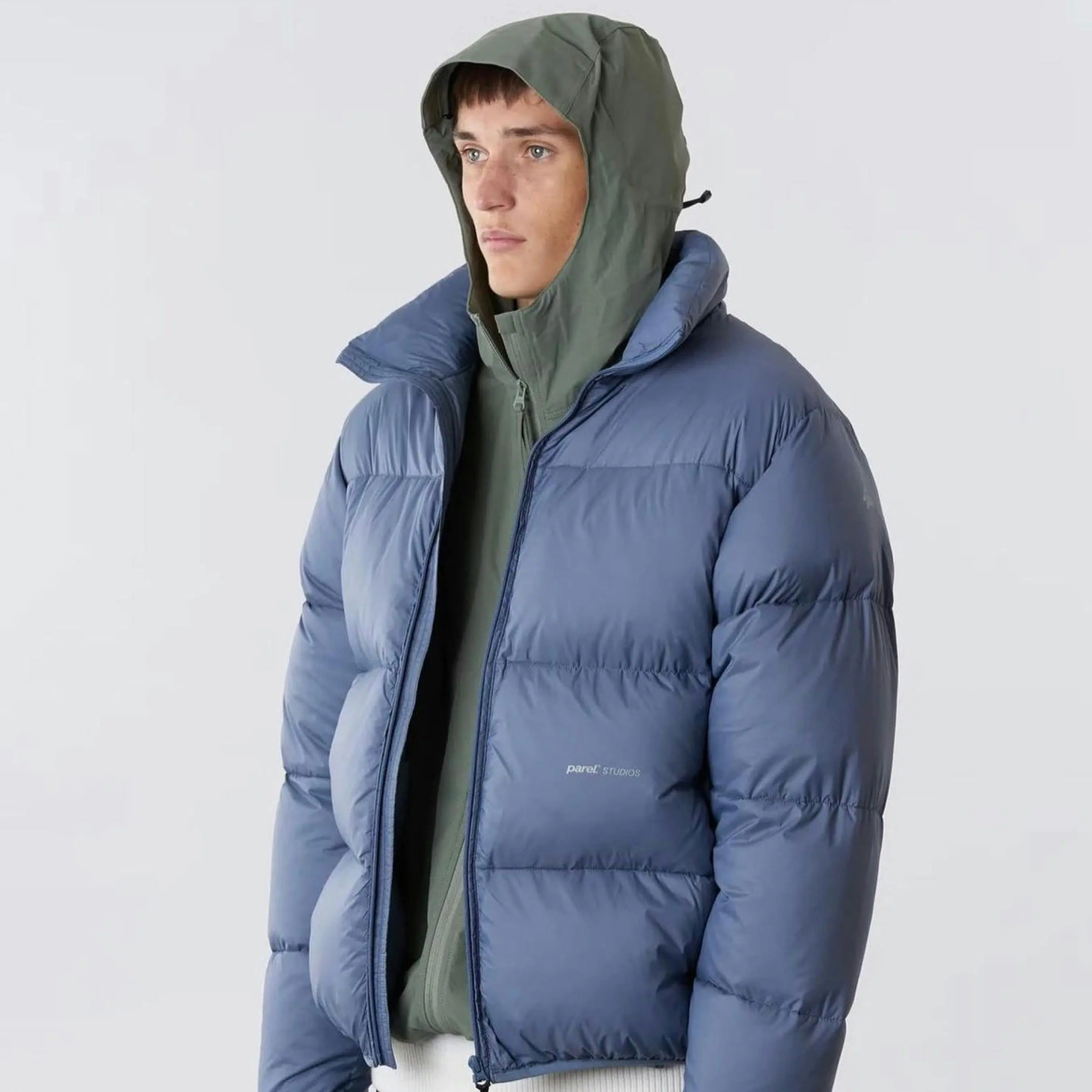
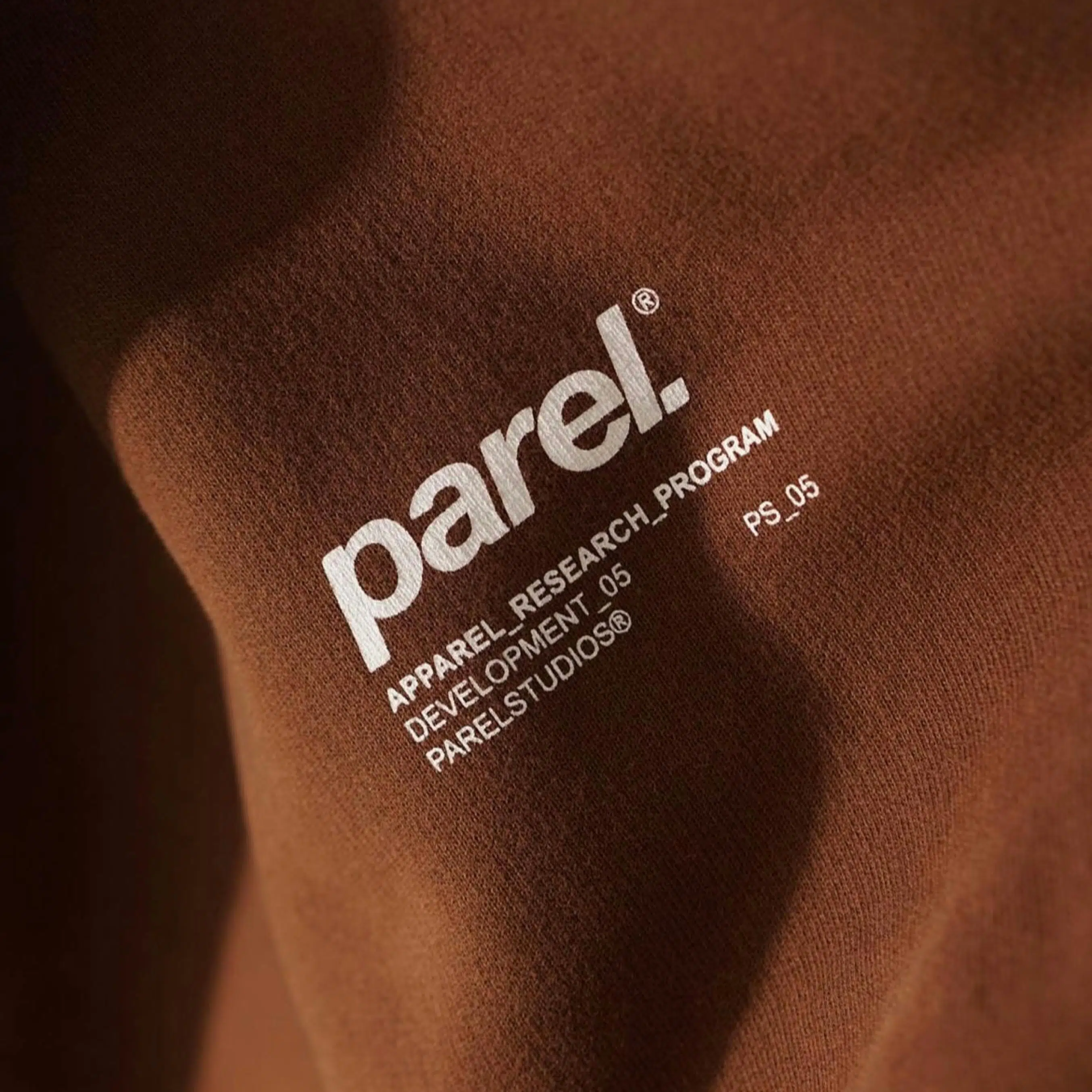
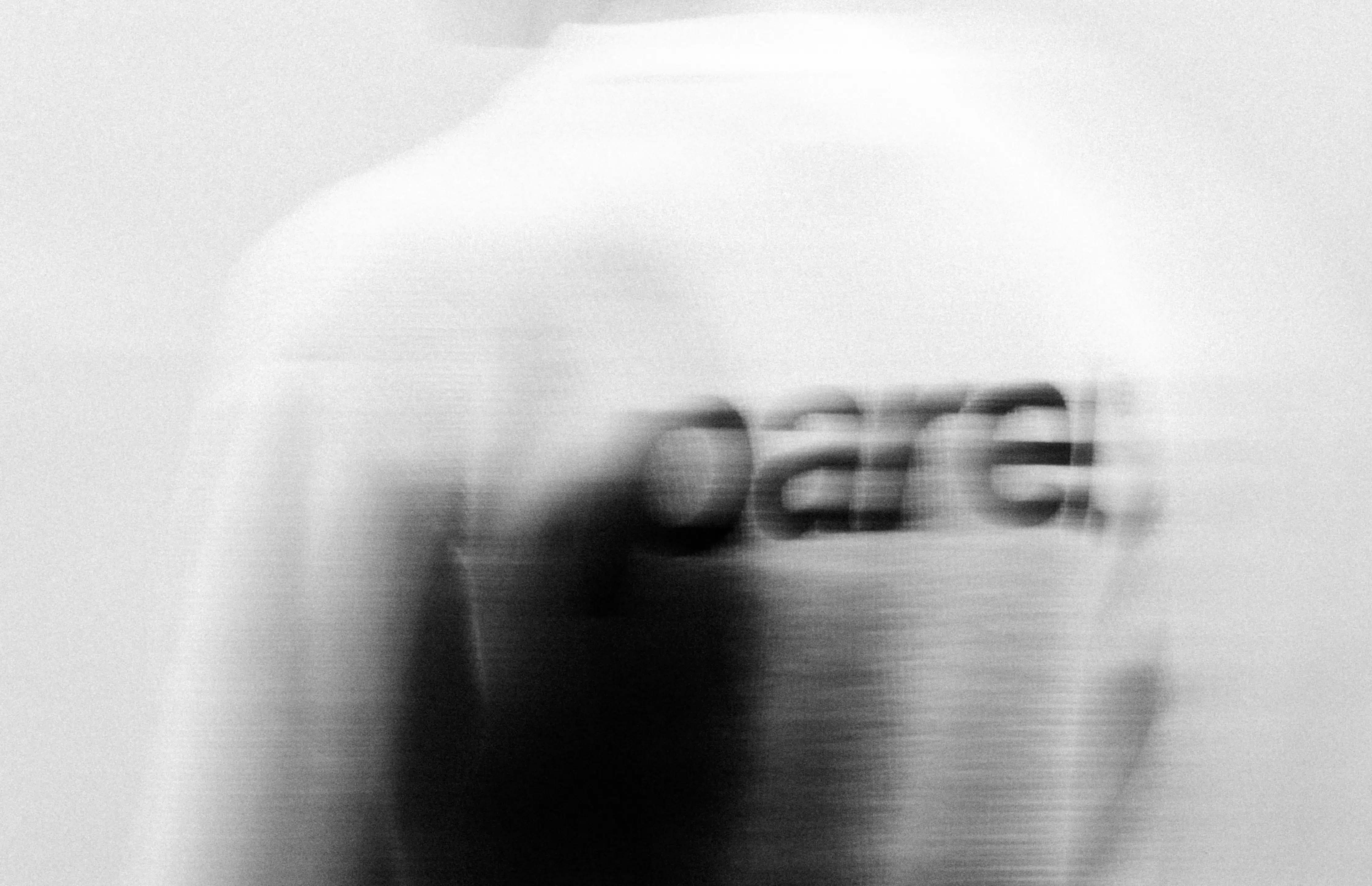
And looking at your career, what would you say are your career highlights so far?
I'd say they have come quite recently.
I haven't released this piece of work at all because I'm not allowed to share any of the images until the campaign is released in September but I've been working with RIMOWA, a suitcase company. They're based all over the world and have a new campaign called RE-CRAFTED, where they have old suitcases which get returned with unique scratches and are then moulded over and then they resell them. So it's all around reusing products. It was a really cool project. I think to work with a brand of that size is a real honour for me. I'm really looking forward to sharing that in September when the adverts are to be going out in German newspapers (I think).
And the other one you may have seen but I haven't really spoken about too much on Instagram, but I’m working with a company called Holiday Club. They're based in London and they are providing education to young creatives in the inner London areas. I've been doing some design workshops with them, giving them a bit of transparency in the industry and a few tips and tricks on how to develop their own careers.
I like that you mention Holiday Club, it swings back to what we spoke about earlier in terms of community and giving back. So it's clearly something that you really enjoy doing. Do you have any plans to get more involved with lecturing or even mentoring younger students or anything like that?
I have set up a company called BCDFLOW. The aim is to release products tailored to helping designers looking to advance their career. The name stems from the pillars I believe are essential for a successful career as a designer. 'B' is for Business as I believe a strong foundational knowledge of business and marketing is a fundamental component of being a designer. 'C' is for community, which is why I have set up the BCDFLOW Community available through the bio in my Instagram. 'D' is for design, where I teach the principles of design which have allowed me to reach the point I am now. The last word is 'FLOW'. This is a play on the 'flow state' I love to enter when working. I find myself in a state of utter focus and control when working. Setting up your office, workstream and life to reach this state is something I think we should all strive for. I will also be releasing more free educational content in future as well.
With regards to clients, everyone always talks about purpose-driven work but it’s money vs purpose. In your mind, what wins?
I think it has to be for purpose, but I also think it has to be a mix. I think purpose comes first, but if you have that purpose and you have that passion for what you do I believe inevitably the money will follow.
But listen, I'm not gonna come on here and say I don't care about money because obviously it's a big part of everyone's career choices and how much they work and all this kind of stuff. I want to have a nice life and I want to have nice things but ultimately I would much rather be earning less and working on something I care about than earning a lot more on something that I absolutely hated.
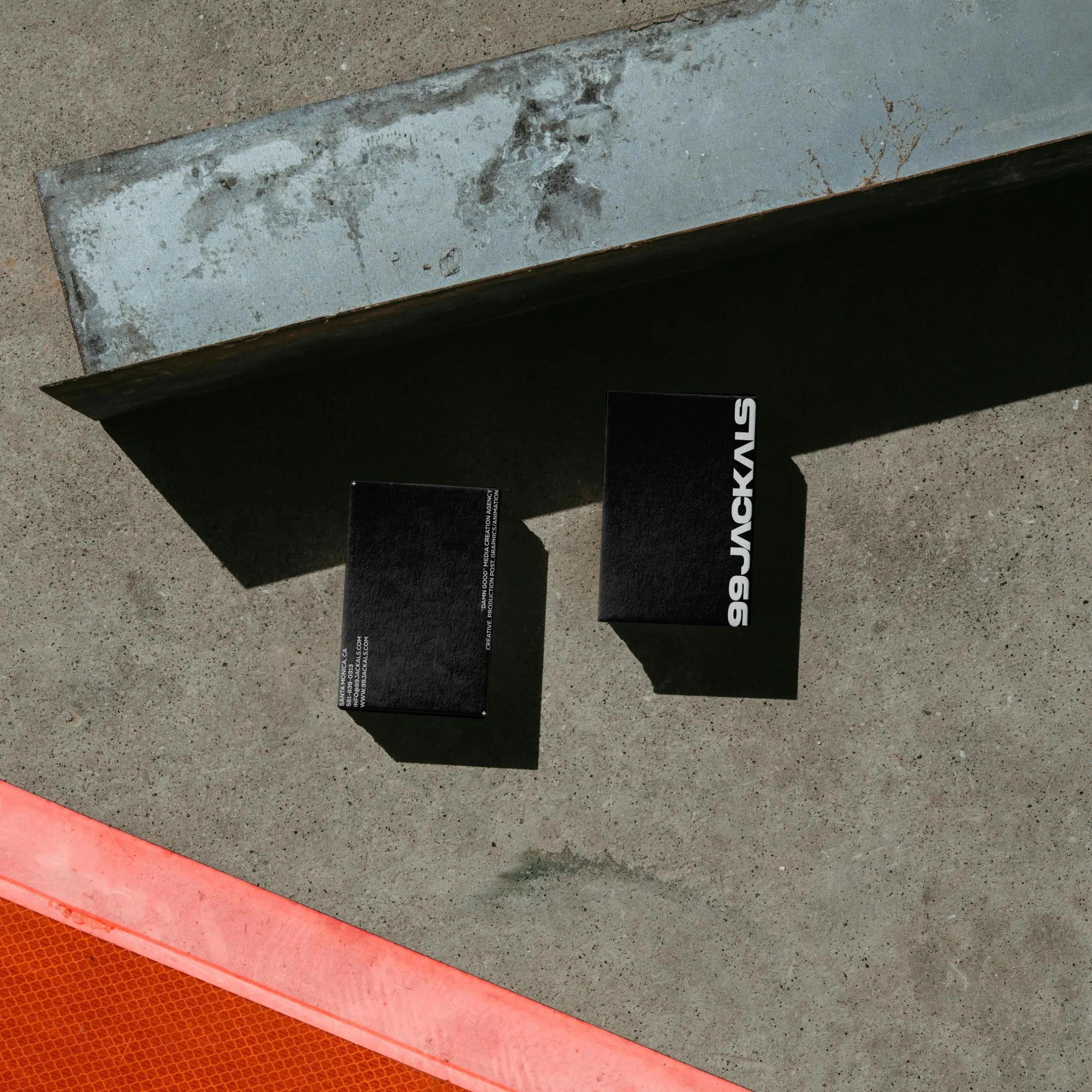
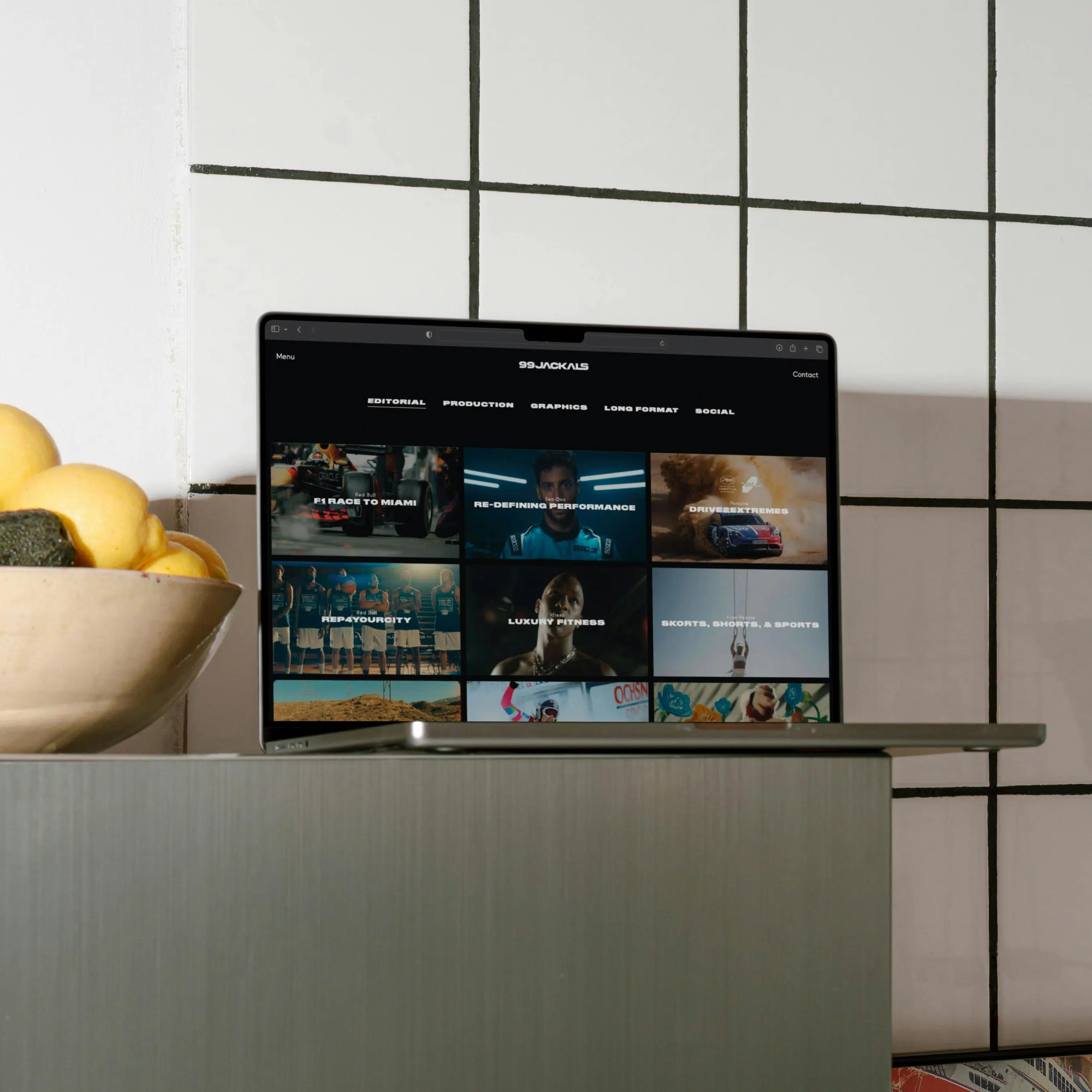
I think maybe that is a good bridge into one of the last questions. If I had to say to you, Joe, you get to choose any clients in the world. Who is your dream client and why?
You know what, I think most people would probably say Nike or Adidas. I'm actually going to pick a much smaller company based in the UK, which may be a really boring answer actually Rogan, so I apologise. They're definitely making some waves in the luxury fashion scene now in the UK. They're called Cole Buxton and they’re an apparel company.
I just absolutely love their overall aesthetic so I think working with them in some kind of capacity would be a real dream for me. You probably weren't expecting that kind of answer but I would say Cole Buxton is a massive one.
I prefer that answer, because it's something unexpected and I can go check them out. But are you the kind of person that approaches them and messages them on Instagram or LinkedIn, or do you kind of just let it go and just hope that they can potentially find you at some stage?
In the past, I have reached out to a couple brands and a couple artists and I made a video about one of them. An artist called Black Sam, that I reached out to, ended up becoming an amazing project to work on. I think in the future, I might, because if I have a spare month where I'm not booked, I would love to work with them in some kind of capacity. It's important to be able to sell yourself and reach out to brands if you're passionate about working with a particular brand. It can work sometimes and it definitely has done for me in the past.
There was one where I reached out to someone, and they said thanks for the message and then nothing happened for about seven months. Then they said “I've got this new album, can we work on that?” And that's how that happened. So you've got to be patient.
If you were to choose four of your favourite agencies, studios, or freelancers currently, who would they be?
I've got to say that's DashDigital first, of course. I honestly absolutely love your work. I think you're putting out some amazing stuff recently, I saw your project Lemkus the other day. I love your overall aesthetic. One of the biggest things I love about you guys is the way you showcase your work on social media, and on your website as well.
In terms of the others, I’d say it’s always been MOUTHWASH. I think that they're a very popular one now and a lot of people will say MOUTHWASH, but they seem to be just a level above at the moment. I think they're just absolutely amazing. The clients they get and the way they treat them all very differently, yet within their cool clean style is very impressive.
There's also one called Querida, which is another agency. They're really cool and putting out some really nice work, very different as well. It's not always so clean. Sometimes it's quite unique and developed in places and I love the way they work photography, so they're definitely one. And then Something Special Studios is another one.
There are so many freelancers that I love because I'm always talking to freelancers and learning from them. There's just so many people I take inspiration from. My saved section on Instagram and Pinterest is just ridiculous. I have so much work saved there. I'm just constantly absorbing things.
I think we both probably agree that it's a great industry to be a part of, because there's always so much development. Always so much innovation. And I think the industry is great in the sense that it's very positive. People responding when people post work and providing feedback and sharing what they like or don't like about things. There's probably not many industries in the world that are as supportive. While I do say that we need to work on transparency and helping each other, I think we are quite a tight-knit industry.
I think we both probably agree that it's a great industry to be a part of, because there's always so much development.
Each poster is a tribute to the individual we interview, incorporating elements from their conversation into the artwork and designed to encapsulate their distinct style.
